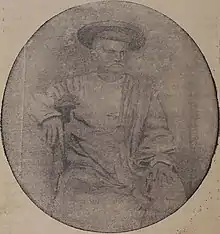Durgaram Mehta
Durgaram Manchharam Dave (1809–1876), popularly known as Durgaram Mehta or Durgaram Mehtaji, was a Gujarati social reformer, essayist, diarist and teacher from British India. Along with his companions he founded the Manav Dharma Sabha, the first reform association of Gujarat, at Surat in 1844, and pioneered social reform activities in Gujarat. He was the first to use autobiographical writing in Gujarati literature by keeping minutes of the transactions of the Manav Dharma Sabha with his comments and views.
Durgaram Mehta | |
|---|---|
 Durgaram Mehta | |
| Born | Durgaram Manchharam Dave 25 December 1809 |
| Died | 1876 (aged 66–67) |
| Occupation | Social reformer, essayist, diarist, school-teacher |
| Known for | foundation of Manav Dharma Sabha |
Biography
Durgaram was born in Vadnagara Nagar Brahmin family on 25 December 1809 in Surat.[1][2] His mother, Nanigauri, died when he was eleven, and thereafter he was brought up by his aunt.[3]
He was able to learn tables up to twenty at the age of eight and then was an apprentice learning how to keep accounts in a local firm. At the age of twelve, he was employed by the same firm on a very low salary. Though he was fond of reading books, there were not many easily available. He accompanied his aunt to Bombay in 1825 and studied for six months in a government Gujarati School free of charge and was found capable to handle a school. Hence In 1826, he returned to Surat and opened a Gujarati school on behalf of government, at Haripura on 13 September, on a monthly salary of 20 rupees. In 1827, he was sent to Olpad near Surat to open a new school.[3]
In 1831, he married, at the age of 22, a 10 years old girl, who died in 1838, and thereafter he married for the second time (in 1843[2]) when he was 44 with a girl of 11 years.[3] Since Durgaram himself was a strong supporter of widow-remarriage, the event of his second marriage has been criticized by Mahipatram Rupram Nilkanth, biographer of Durgaram.[4] Durgaram died in 1876.[1]
Social reform
Durgaram is considered to be pioneer of social reform activities in Gujarat. He concentrated his attention on the problem of widows, and led a movement supporting widow remarriages. Despite strong opposition of the orthodox section of society, he continued to support such reform activity, but later he gave up this activity when he married a teenager girl after he became a widower.[5]
Manav Dharma Sabha
Durgaram believed that among the Hindus there are many sects and sampradayas and this state prevented them from believing in one God. He therefore desired that some effort must be made to make people see the truth and with this in mind, he thought of founding an association in his native town of Surat.[3] Around 1842, Durgaram came in contact with Dadoba Pandurang, who transferred from the Elphinstone Institute of Bombay to the Government English School, Surat. Dadoba, closely associated with the social reformers group of Bombay, encouraged Durgaram to start a reform association. Henry Green, the headmaster of Surat English School, also supported Durgaram. On 22 June 1844, Durgaram , along with Dadoba, Dalpatram Master, Damodardas and Dinmanishankar, founded the Manav Dharma Sabha, which became a main center for the social reform activities. It is regarded as the first reform association of Gujarat.[2]
On 10 February 1843, with the suggestion of Dadobha, Durgaram already had prepared the seven basic principles of the Manav Dharma Sabha. They were:[2]
- There is One God, the Creator of all this Universe.
- All human beings belong to one fraternity.
- Religion is one for all men : yet, if they follow several faiths each one believing in one's own, one is only following the bent of one's mind.
- Men should be judged by the qualities they have; and not by their lineage (or caste).
- Men should act with discrimination.
- The object of all the action should be to win the grace of God.
- All should be taught the importance of the path of Righteousness.
In 1846, Dadoba transferred to Bombay, and, in 1850, Durgaram left Surat permanently and then the Manav Dharma Sabha was disbanded.[2][5]
Writings
Durgaram is noted for his diary which records his public activities and minutes of the Manav Dharma Sabha from 1843 to 1845. He used to jot down all his ideas and experience in connection with the field of education and such activities in diary regularly. This diary serve as the first autobiographical notes in Gujarati. Later on the basis of this diary Mahipatram Rupram Nilkanth wrote biography of Durgaram under the tile Mehtaji Durgaram Manchharamnu Jivancharitra.[6][7]
He also wrote a book on science named Vijnan Nu Pustak.[3]
See also
References
- Shastri, Keshavram Kashiram (1977). ગુજરાતના સારસ્વતો Gujaratna Saraswato [Who's Who in Gujarati Literature] (in Gujarati) (1st ed.). Ahmedabad: Gujarat Sahitya Sabha. p. 51. OCLC 900401455.
- Raval, R. L. (1986). "Social Environs and Refom Movement in 19th Century Gujarat : The Case of Durgaram Mehtaji". Proceedings of the Indian History Congress. 47 (VOLUME I): 591–598. JSTOR 44141608.(subscription required)
- Chavda, Vijay Singh (1982). "Durgaram 'Mehtaji' and the Manav Dharma Sabha in 1844". Modern Gujarat. Ahmedabad: New Order Book Company. p. 167–. OCLC 9477811.
- Shukla, Jaykumar R. (January 2002). "મહેતાજી, દુર્ગારામ" [Mehtaji, Durgaram]. In Thaker, Dhirubhai (ed.). ગુજરાતી વિશ્વકોશ [Gujarati Encyclopedia]. 15 (1st ed.). Ahmedabad: Gujarati Vishwakosh Trust. pp. 500–501. OCLC 248968453.
- Thaker, Dhirubhai; Desai, Kumarpal, eds. (2007). "Social Reforms in Gujarat". Gujarat. Ahmedabad: Smt. Hiralaxmi Navanitbhai Shah Dhanya Gurjari Kendra, Gujarat Vishvakosh Trust. p. 78. OCLC 680480939.
- Datta, Amaresh, ed. (1989). Encyclopaedia of Indian Literature: k to navalram. New Delhi: Sahitya Akademi. p. 2653. ISBN 978-81-260-1804-8.
- Jhaveri, Mansukhlal Maganlal (1978). History of Gujarati Literature. New Delhi: Sahitya Akademi. p. 142. OCLC 462837743.